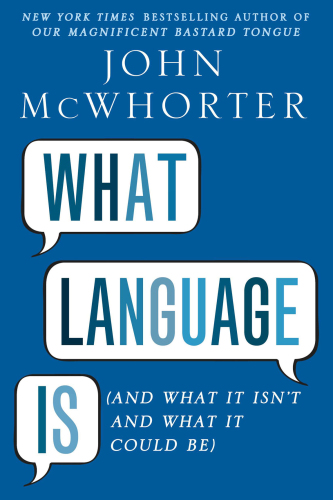
What Language Is
And What It Isn't and What It Could Be
کتاب های مرتبط
- اطلاعات
- نقد و بررسی
- دیدگاه کاربران
نقد و بررسی

Starred review from April 25, 2011
The King's English topples from the throne of linguistic legitimacy in this rollicking tour of human language. Columbia University linguist and bestselling author McWhorter (Losing the Race: Self-Sabotage in Black America) surveys a Babel of languages from behemoths like Chinese to isolated, insanely complex Siberian languages, New World creoles, and unfairly disparaged street slangs. His approach is organic rather than prescriptive; he argues that languages are living entities that grow, mutate, and interbreed, creating new words and grammatical forms. The fluidity and incorrigible "disheveledness" of language, he contends, means that no linguistic practice is uniquely correct, least of all persnickety written standards that ignore spoken realities. An insightful chapter on African-American dialect analyzes it as a slightly simplified but equally expressive version of Standard English, shaped by the same pressures that make modern Hebrew a simplified version of the ancient tongue. McWhorter unearths a wealth of colorful linguistic facts (in the New Guinean language Berik, Nice to see you comes out as My gall bladder is really warm today), from which he distills larger principles, couching his erudition in a lucid, supple prose. The result is a fascinating romp through the ornery wonders of language. Illus.

May 15, 2011
Linguist and New Republic contributing editor McWhorter (Linguistics and Western Civilization/Columbia Univ.; Our Magnificent Bastard Tongue: The Untold History of English, 2008, etc.) returns with a discussion of what languages are, and some insightful thoughts about why we view some as "primitive" and others as "advanced."
The author employs a jumping-bean style that briskly leaps from frisky allusions to popular culture—not always recent: Wilt Chamberlain and Warren Beatty appear in one sentence—to dense descriptions of the complexities of language. Throughout, the author uses what he calls the "underwater approach" to language analysis, noting how early scientific illustrations of marine life showed critters dried and displayed on a beach; not until we could stay underwater for extended periods could we describe these creatures in their own habitat. Linguists offer a similar view of language. Observing that any language is a "fecund, redolent buzzing mess of a thing," McWhorter groups his observations under five headings—languages are ingrown, disheveled, intricate, oral and mixed. The author dispels many common misconceptions, among them the notion that languages spoken by isolated peoples are simple or primitive. On the contrary, the more isolated a language, the more complex it becomes, as native speakers add numerous layers of special-purpose features. It's only when other, non-native adults arrive that the language begins to simplify. He notes, for instance, the enormous complexity of Navajo (and, yes, he deals with the code talkers). He also reminds us that spoken languages antedate by millennia any written language and quips that all languages are "sluts," taking on the attributes of all comers. McWhorter also dismisses the notion that Black English is Africa-born but recognizes the dialect's dignity, calling it "a different kind of English but not a lesser one."
Turgid at times, but mostly eye-opening, even liberating.
(COPYRIGHT (2011) KIRKUS REVIEWS/NIELSEN BUSINESS MEDIA, INC. ALL RIGHTS RESERVED.)

March 15, 2011
Columbia linguistics professor McWhorter is the author to go to when you want to talk language; his best sellers include Our Magnificent Bastard Tongue. Here McWhorter gives us insight into the linguist's job while explaining how languages are born, grow, change, and sometimes die. Fun for all--or at least all with a passion for words.
Copyright 2011 Library Journal, LLC Used with permission.

























دیدگاه کاربران